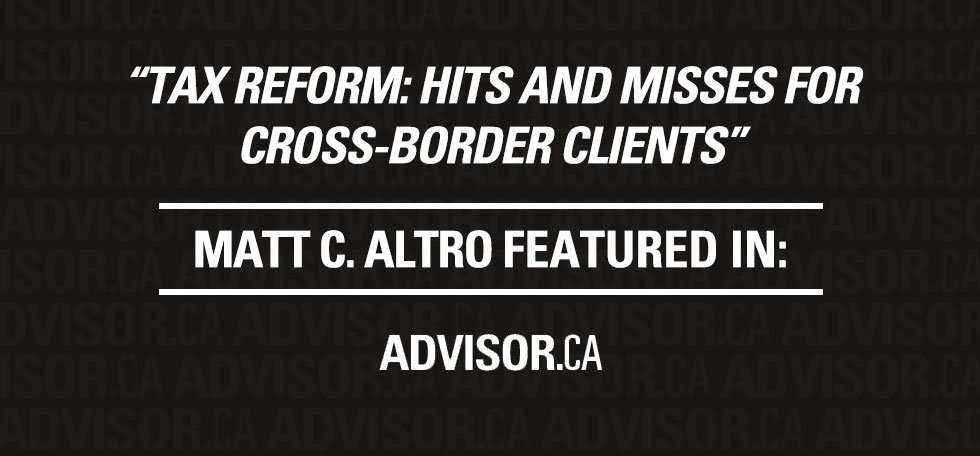Matt C. Altro was recently interviewed by Michelle Schriver from Advisor’s Edge to analyze the consequences and opportunities when it comes the tax reform in the US, which went into effect January 1, 2018. The analysis was published in the February edition of the Advisor’s Edge magazine and also appeared online on Advisor.ca.
In the article, Matt reviews the increase to the US estate tax exemption, changes for cross-border business owners, the 2017 tax filing requirements for cross-border clients, changes affecting Canadian corporations, and tax changes for individuals.
To read the article you can see it in part below, or click here to view it on the Advisor.ca website.
Tax reform: Hits and misses for cross-border clients
Michelle Schriver
Advisor’s Edge
February 17, 2018
The largest U.S. tax change in more than three decades is expected to drive the U.S. economy, thanks to both corporate and individual tax cuts.
Unfortunately, your cross-border clients won’t be going along for the ride. In fact, it may have some American clients thinking about renouncing their U.S. citizenship.
Here’s a closer look at the hits and misses for cross-border clients from the 1,097-page legislation President Donald Trump signed late last year. (All figures are in U.S. dollars.)
U.S. ESTATE TAX EXEMPTION INCREASES
Let’s start with the good news.
Canadians with more than $60,000 in U.S. property (real estate, stocks, life insurance), as well as worldwide assets over an exemption threshold ($5.49 million in 2017), are subject to U.S. estate tax of 40% on U.S. assets at death. (For Canadians and U.S. non-domiciled citizens, the exemption is pro-rated based on the value of U.S. assets relative to worldwide assets).
Effective for 2018, U.S. tax reforms double the exemption to $11.2 million per person ($22.4 million per family), so only ultra-wealthy Canadians—and ultra-wealthy U.S. citizens living in Canada—who own U.S. property will be affected by U.S. estate tax.
But there’s still value in estate tax planning.
Noting that Hillary Clinton campaigned on lowering the exemption, Matt Altro, president and CEO of MCA Cross Border Advisors in Montreal, asks, “What happens in two years if the Democrats get back in?” He adds that the exemption has varied over the last couple of decades and has never been as high as $11 million. “It probably has one way to go, which is back down,” he says.

